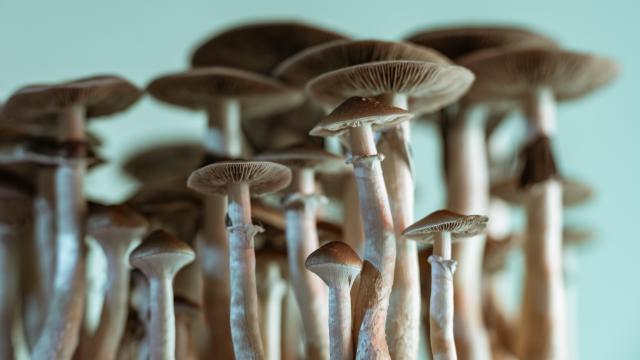A study out this week is the largest of its kind to suggest that psilocybin — the key ingredient in psychedelic mushrooms — can be a potential treatment for depression. The randomised trial found that people with treatment-resistant depression who received a large dose of psilocybin along with psychological support experienced a significant reduction in symptoms up to three weeks later, as compared to those who took a much smaller dose of psilocybin.
The research is being funded by UK-based company Compass Pathways, which is hoping to develop its own proprietary form of synthetic psilocybin as a treatment for depression and other mental health conditions. Their latest results come from a Phase IIb trial that was conducted across 10 countries, including the U.S, and involved 233 volunteers with depression that hadn’t responded to at least two other treatments.
The volunteers were randomised to be given a single dose of psilocybin at three varying strengths: 1 milligram, 10 milligrams, or 25 milligrams. Before the trial, all the participants were given counselling to prepare them for the psychedelic experience. Following the treatment, they were monitored and told to focus inward while listening to a specially designed music playlist for about six hours. They then received two counselling sessions — the first a day later and the second a week later — meant to help them process the insights they might have gotten during the psilocybin trip. Finally, their mental health outcomes were tracked for 12 weeks.
The lowest dose of psilocybin that people received was intended as a control since it was expected to have little to no therapeutic effect. Compared to this control dose, people on 25 milligrams of psilocybin experienced a significant reduction in symptoms from their baseline up to three weeks later. Those on the 10-milligram dose experienced a greater reduction of their symptoms as well, but the difference wasn’t statistically significant compared to those who took the 1-milligram dose. The findings were published Wednesday in the New England Journal of Medicine.
According to the study authors, this is the largest trial of psilocybin for treatment-resistant depression to be published so far. But while the topline news is encouraging, there are some important caveats to mention as well.
Earlier data has suggested that psilocybin would have a more potent effect on reducing depression than this study showed, for instance. Other, smaller studies have found that more than 50% of patients, even those with treatment-resistant depression, improve so much after taking psilocybin that they could be considered in remission, whereas the same was true for only 29% of those on the highest dose in this study at the three-week mark. The trial also didn’t clearly show that the benefits of psilocybin can last up to 12 weeks later, as the authors had expected it to (there were more people on the highest dose who had a sustained response compared to the control group, but not enough to be statistically significant).
A majority of people across all three groups (77%) also experienced adverse effects like headache, nausea, and dizziness. And a greater but still small number of people taking the 10- or 25-milligram dose reported experiencing new suicidal thoughts or behaviour than those in the control group did. Some antidepressants are thought to temporarily increase the risk of suicide ideation, particularly for certain groups like children and teens, so this possible side effect isn’t unprecedented. But the risk will merit close monitoring in subsequent trials, and it could lead to a warning label should psilocybin one day be approved for depression, similar to the black box label attached to some existing antidepressants.
None of this is necessarily damning for the future of psilocybin in medicine. The expected benefits of an experimental treatment can often shrink over time as trials get more rigorous in accounting for things like the placebo effect. And even if psilocybin isn’t quite as magical as hoped for, it could still make a crucial impact, given the lack of options for those with treatment-resistant depression.
For its part, Compass Pathways is still forging ahead. It plans to conduct two Phase III trials of psilocybin, scheduled to begin by the end of 2022, that will ultimately enroll over 900 participants. Other trials testing psilocybin for conditions like post-traumatic stress disorder and tobacco addiction are on the way as well.
If you or anyone you know needs help, Lifeline is available 24/7 on 13 11 14. Call 000 in an emergency.
